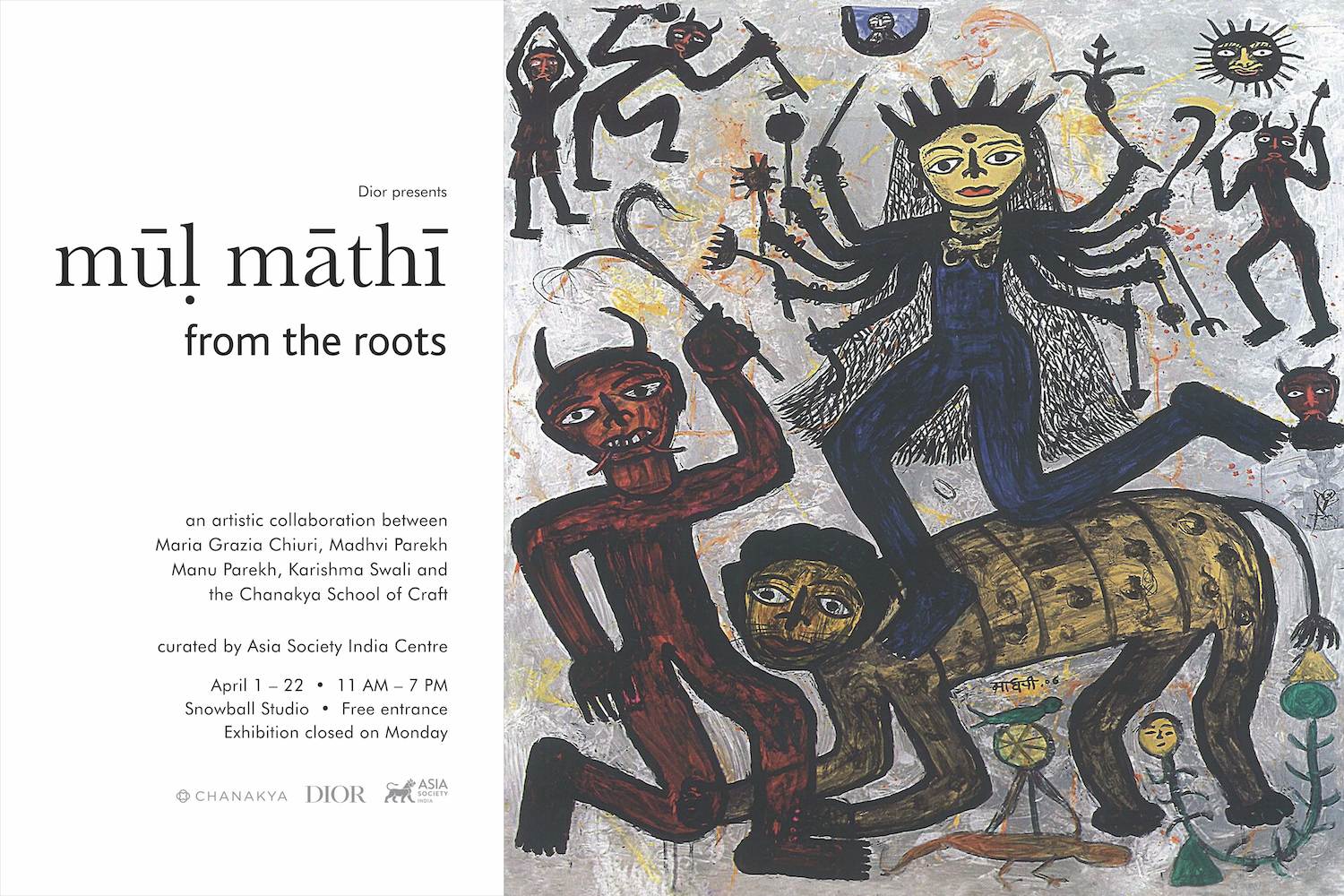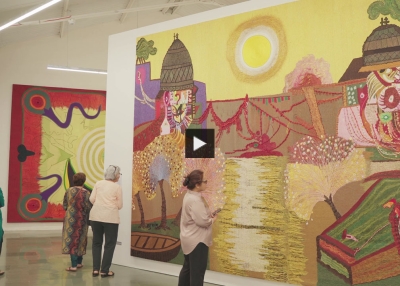Mūḷ Māthī // from the roots
In 2021, the Chanakya School of Craft and the Chanakya Atelier collaborated with Dior for the commission of a series of monumental textile artworks by Madhvi and Manu Parekh, which were presented at the spring-summer 2022 haute-couture presentation in Paris. These works have been interpreted in craft by Karishma Swali and handcrafted by master artisans from the Chanakya Ateliers and female artisans from the Chanakya School of Craft, a non-profit school and foundation dedicated to craft, culture and creating new autonomy for women. Using natural pigments and through innovative design and techniques, the textiles are large-scale embroidered interpretations of Madhvi and Manu Parekh's artworks.
As a postscript to the original project, these artworks are being presented in India for the first time, along with original artworks and archival material. The exhibition Mūḷ Māthī // from the roots presented by Dior and curated by Asia Society India Centre, brings to life a special artistic collaboration between Maria Grazia Chiuri, Madhvi Parekh, Manu Parekh, Karishma Swali and the Chanakya School of Craft. It is an homage to the Parekhs, whose practices have a long-standing relationship with vernacular artistic traditions, an ode to the legacies of embroidery-work and textiles, and a critical reflection on modes of collaborative art-making.
Exhibition design: Reha Sodhi
Text: Priyanka D’Souza
Title credit: Prakruti Maniar
EXHIBITION DETAILS
Public Opening Dates: April 1, 2023 - April 22, 2023
Venue: Snowball Studios Pvt. Ltd., Mumbai, India
Time: 11:00am - 7:00pm; Tuesday - Sunday (closed on Mondays)
EXHIBITION BROCHURE
THE COLLABORATORS
Asia Society India Centre
The Asia Society is a non-profit, non-partisan institution whose purpose is to navigate shared futures for Asia and the world across arts and culture, policy, education, sustainability, business, and technology. With a network of 14 centres in the United States, Europe, Asia and Australia, Asia Society fosters insight, encourages engagement, elevates regional voices, informs and educates new audiences, addresses complex – and where necessary – contentious challenges, engages in creative problem-solving, and helps deliver real solutions for the benefit of all.
Inaugurated in 2006, the Asia Society India Centre (ASIC) curates and presents critical perspectives on modern South Asia through diverse programming and building networks of engagement within the subcontinent. As a leading platform for regional and global affairs, ASIC's initiatives span a range of interest areas across arts and culture, business and finance, public policy and geopolitics. Within the arts, ASIC's mandate has been to promote and spotlight visual cultures from South Asia and South Asian diaspora, with a particular focus on modern and contemporary art and art communities. Its programmes include panel discussions, lectures, cultural summits, roundtables, exhibitions and an annual Asia Arts Game Changer Awards gala.
In 2022, the Centre consciously moved towards expanding its cultural mandate and began a long-term series of programmes dedicated to exploring craft and vernacular artistic traditions from the region - their histories, evolution and intersection with other forms of creative practice. With this new direction, ASIC hopes to create a space where audiences can collectively question and learn about the myriad contexts of craft and vernacular art in South Asia.
Curating an exhibition like 'mūḷ māthī / from the roots' represents ASIC's growing cultural vision and interest in the crafts. Curated as a postscript to the original artistic collaboration between Maria Grazia Chiuri, Madhvi Parekh, Manu Parekh, Karishma Swali and the Chanakya School of Craft, the exhibition presents the 22 textile artworks, along with archival material, in an Indian context and for Indian audiences for the first time. The exhibition is an homage to the Parekhs, whose practices have a long-standing relationship with vernacular artistic traditions, an ode to the legacies of embroidery-work and textiles, and a critical reflection on the possibilities of collaborations and patronage in the preservation and sustainability of craft-based artistic work.
The curatorial team: Inakshi Sobti (Chief Executive Officer), Radha Mahendru (Director, Strategic Initiative and Development), Ketaki Varma (Associate Director, Programmes), Taarini Savara (Programmes Manager - Arts and Culture) and Alekha Ranjitsinh (Project Manager)
Chanakya School of Craft
Known for creating the extraordinary, Chanakya is inspired by timelessness and rarity. Chanakya’s journey to showcase the everlasting heritage of hand embroidery began in 1986. Helmed by Creative Director Karishma Swali, generations of artisans, art aficionados, preservers and advocates work towards a singular purpose: to ensure that the magic of artisans lives on forever.
Established in 2016, the Chanakya School of Craft is a first of its kind. The non-profit school and foundation are dedicated to craft, culture and a new autonomy for women. The goal for the school is to create a platform of multi-dimensional learning, focused on the arts and crafts while providing equal opportunities to an often-ignored backbone of our communities: women. The holistic curriculum teaches over 300 hand embroidery techniques and is anchored through the voices and lives of historical female figures.
The school has taught over 1000 women to-date, of all ages and socio-economic backgrounds, forming a strong community of skilled, autonomous women. They pursue projects across a wide variety of disciplines, collaborating with artists that include Judy Chicago, Manu Parekh and Madhvi Parekh, fashion houses such as Dior and non-profit organizations, to spread the message of inclusivity and excellence in craft. In the future, they hope to create a global network where design students from all over the world can learn ways in which craft can be seamlessly integrated into art and design.
The master artisans of Chanakya Ateliers and Chanakya School of Craft:
MD Sharif Khan, Samsuddin Mallick, Abdul Hanif Jamader, Sikander Jalil Ansari, Nesarali Moyajem Mandal, Sumanta Mandal, Gautam Bag, Sk Hapijul Rahaman, Nur Md Asgar Khan, Sekh Akbar, Meheraj Amia Midde, Khurshid Rehman Shaikh, Mr Jagannath Pandit, Dipak Kumar Samanta, Tohidul Middya, Sk Rijaul Islam Sekh Abul Kashem, Sk Sahabul Haque, Sekh Sabir Ali, Sekh Mojammel Hossain, Ajit Felu Mallick, Sk Jasimuddin, Nurnabi Mansob Sekh, Abdul Mokim Mallick, Subhas Chatik, Rajabul Mondal, Sarif Middey, Sekh Monirul Hasan, Ajibul Sha, Mohammad Najam, Moidul Islam Midday, Sk Nasimuddin, Hasibul Samser Sekh, Saiahan Ali Sekh, Maharam Ali Sk, Abdur Rahim Samad Khan, Md Sharif Khan, Mohd Rafik Shaikh, Mofijul Delwar Middey, Saber Ali Gayen, Shariphul Isahahk Ali, Md Nehal Mohammad Subhan, Sajid Rashid Khan, Sekh Jiyabul Haque, Mohammad Naushad, Hasangir Idris Khan, Mohammad Mustak Nadaf, Israrul Haque Mohammed Safi Kkhan, Mohammad Said, Shrimanta, Gunadhar Roy, Asit Radhanath Sau, Sekh Selim Ali, Joydev Sau, Sk, Halim Ali, Sk Toymush Ali, Manir Ali Middya, Sekh Atabul Hosen, Sekh Nuruddin, Jaleshwar Arjun Mandal,Mafijul Wajuddin,Sekh Abu Nasar, Hajra Sabir, Sekh Manik Ali, Abusama Gayen, Ali Hasan Ansari, Akbarali, Sajahan Sardar, Mohd Imamuddin, Habib Ali Sardar, Jaidul Bagani, Tayabur Rahman Midday, Sk Golam Mostafa, Faiyaj Alam, Faruk Abubakkar Mallik, Mohd Haneef, Mohammad Sajid, Habibur, Rahaman Mallick, Ashish Bera, Nanda Chhatik, Sattar Ali Khan, Anup Kumar Sen, Jakir Mullick, Mirja Sirajul Islam, Sahin Karim, Sekh Firoz Ali, Mahit Khan, Hamjan Khan, Asadul Mallick, Samim Mollah, Sekh Mahasin Ali, Mohammad Jamashed, Samsuddin Mallick, Fakruddin Mollah, Mahtab Alam, Prashant Manik Maji, Taufiqur Rahman Rajkumar, Kaji Anisur, Golamanbi Mohemmed, Naeem Shahmohammad Mansuri, Bharat Chandra Dolai, Aaktar Mallick, Raja Mallik, Mohd Shamsher, Md Shamim Akhtar, Sekh Najrul Islam, Sk Khoda Hafez, Pintu Kumar, Bhabesh Pattanayek, Ashok Kumar Bera, Biru Bayen, Nantu Manna, Sk Babul Hossen, Dhara Prafulla, Mohd Ishtiyak Alam, Abhijit Ghorui, Mohammed Afashar, Utpal Ghorui, Arup Patra, Sekh Abdul Karim, Sabir Ali Molla, Sekh Selim, Mohammad Tanzim, Najrul Ramjan Khan, Mohammad Israfil, Lakhu Das, Abdul Hanif Jamader, Mohd Ikram Alam, Mohd Sikandar, Mohd Sadam, Mohd Nurnabi, Rashid Ali Naiya, Arif Mistri, Baharuddin Molla, Hasibur Rahaman Khan, Md Mushtak Alam, Somnath Mondal, Dildar Midde, Majed Sekh, Bijoy Pagre, Sekh Saifuddin Ali, Rehan, Asit Banyen, Jahangir, Kaji Abdul Mannan, Mohd Rajjak, Samar Paramanik, Sk Sofik, Mohd Elahi, Mohammad Tauker Shahjahan, Najirul Sekh, Sekh Niyaz Aktar, Abbasuddin Kayal, Mohd Khurshid, Mohammad Firoj, Samar Diger, Moydul Mallik, Sanwar Ali Kayal, Idrish Suleman, Sadre Alam Ansari, Javed Kayal, Mo Sahjhan, Islam Shaikh, Mokhtar Alam Ansari, Sekh Aktar Ali, Nisar Alam, Rijabul Mallick, Prdeep Kumar, Robin Purkait, Sofiyan Khan, Sk Surabuddin, Mohammad Samim Alam, Moslem Shaikh, Lutfar RahamanSepai, Alamgir Kayal, Iyakub Ali Sek, Aftab Ansari, Gulzar Shaikh, Hasem Mollah, Ummat Ali, Istekhar, Sk Akhtar Rahaman, Mohammad Ajim Ansari, Mohammad Shoaib Alam, Sekh Jobibur Rahaman, Sk Reyajul Rahaman, Mohd Moinuddin Mohd Nizamuddin, Arik Hajam, Nakul Panja, Sk Md Asadulla, Mohammed Maruf Hasan Shaikh, Mohd Umaish, Jamil Ahmad, Asfatulla Ali Mondal, Rejabul Manik, Giasuddin Mallick, Mohd Yusuf Mohd Rafique Shaikh, Raju Mondal, Sujeet Prasad, Mohsin Mallick, Moslamur Mollick, Zahir Abbas Mondal, Najir Mirdey, Mehebub Alam Middey, Vijaya Sadashiv Jadhav, Rupali Mahesh Pawar, Gayatri Sanjay Tiwari, Snehal Shreeram Kasar, Khan Rukhsar Abdul Latif, Sayra Shaikh, Anita Auti, Gangotri Singh, Pramila Shitole, Nilam Bhujbal, Rekha Phapale, Sayli Shirke, Soni Choubey, Suvarna Mahale, Aarti Hande, Reena Nakhi, Shweta Jadhav, Priti Koshti, Nisha Susvirkar, Ragini Saroj, Asmi Lanjwal, Bushra Khan, Chaitali Dalvi, Pranjal Mharse, Priyanka Shahu, Reshma Pawar, Saira Khan, Sanika Ambokar, Saniya Mate, Sumaiya Shaha, Bhakti Dave, Supriya Sarate, Jyoti Kamble, Jyoti Gaikwad, Kainat Shaikh, Mayuri Jadhav, Meghana Gaikwad, Sakshi Bhalerao, Saba Sayyed, Sakshi Gaikwad, Sanika Sawant, Saniya Sayyed, Snehal More, Zeba Sayyed, Ashlesha Kore, Pornima Koli, Ansari Saba Mohd. Umar, Khan Saniya Mohd. Akhatar, Sakshi More, Jayshree Katwantkar.
Dior
Christian Dior was the designer of dreams. As soon as his House was founded in 1946, and consecrated by the revolution of the New Look, his visionary spirit never ceased to glorify women all over the world. “Fabric is the sole vehicle of our dreams (...). Fashion, in sum, comes from a dream, and dreaming is an escape,” he wrote. Season after season, this exceptional heritage is reinvented by the singular creative passion, force and modernity of the House’s Creative Directors who – from haute couture to perfumes – make the Dior magic live on with audacity, exceptional savoir-faire and its unique beauty of the gesture.
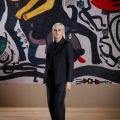
Maria Grazia Chiuri was born in Rome in 1964. Inspired by her mother, a dressmaker, she knew early on that shewould follow the same path. She enrolled at the Istituto Europeo di Design in Rome, where she trained in the technical side of fashion while exploring the Italian capital’s cultural heritage. She began her career at Fendi in 1989, where she oversaw handbag design. In 1999, she was appointed head of accessories at Valentino, where she became the brand’s co-creative director alongside Pierpaolo Piccioli from 2008 to 2016. In July 2016, Maria Grazia Chiuri was named Creative Director of Dior women’s collections, becoming the first woman to hold this position.
Following the Dior autumn-winter 2019-2020 haute couture show, she was decorated, on behalf of the President of the Republic, with the insignia of Knight of the National Order of the Legion of Honor, by Secretary of State Marlène Schiappa. She has encouraged a powerful celebration of sorority and inclusivity combined with boundless open-mindedness. True to her committed vision, Maria Grazia Chiuri weaves multiple dialogues with artists and cultures from across the globe in order to preserve and transmit their savoir-faire to younger generations. In parallel, she frequently collaborates with women artists from all cultures – writers, illustrators, choreographers, filmmakers... – celebrating art in all its forms, at the intersection of heritage, dreams and innovation.
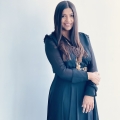
Since 1998, Karishma Swali has led Chanakya International, a global textile house committed to the conservation, revival and innovation of Indian craft. Throughout her 25-year career, which has included stints at international luxury houses, Karishma has worked closely with artists, conservationists, and advocates to highlight India’s diverse craft traditions. In 2016, Karishma co-founded the Chanakya School of Craft. A first of its kind, this non-profit school is dedicated to craft, culture and creating new autonomy for women. The school has educated over 1,000 women to date, teaching over 150 hand embroidery, hand weaving and macramé techniques through a holistic curriculum anchored in the voices and lives of historical female figures.
With the support of Dior and Creative Director of Dior women’s lines, Maria Grazia Chiuri, the Chanakya School of Craft has collaborated with notable contemporary artists since 2020, including Judy Chicago, Eva Jospin, Manu Parekh, Madhvi Parekh and Mickalene Thomas. The immersive art installations that serve as the scenography for Dior’s couture shows blend the boundaries between fine art and craft; the works have since been featured at the Brooklyn Museum of Art, the DeYoung Museum in San Francisco and the Museum of Impressionism in Giverny (France).
In addition to her role at Chanakya, Karishma co-founded the luxury Indian bridal brand Jade with Monica Shah, as well as the contemporary line Moonray, with her daughter Avantika Swali. Karishma was the recipient of the 2022 Grazia Millennial Award for Contemporary Craftsmanship, named one of the top 10 leaders in the fashion industry by CEO Insights (2021), recognized as a Cultural Ambassador by Asia Society India Centre and has been a member of the BoF500 since 2022.
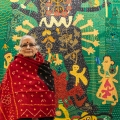
Madhvi Parekh (b. 1942 in Gujarat, India; lives and works in New Delhi). Madhvi’s traditional representations revolve around her childhood memories, Indian mythology, women’s craft, art and folk legends, all of which are aimed at narrating a story or a life experience. As a self-taught artist, apart from folk motifs and figures, she also uses imaginary, dream-like characters and spiritual abstractions that celebrate the male-female and real-surreal dichotomies.
In 1975, Madhvi won a certificate of merit at the Women’s International Exhibition at the Rashtrapati Bhawan in New Delhi. In 1979, she was awarded the National Award from the Lalit Kala Akademi in New Delhi. She was the subject of Dwitiya, a documentary film produced by the Ministry of External Affairs, Government of India, along with her husband artist Manu Parekh. She has participated in exhibitions around the world, including the Metropolitan Museum of Art, New York (where her work is part of their permanent collection); Frieze, London, Amsterdam, New York, Australia and Hong Kong. In 2017, a retrospective of her work entitled The Curious Seeker was shown at DAG, New Delhi. The exhibition traveled to DAG, Mumbai in 2018 and DAG, New York in 2019.
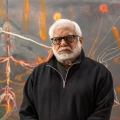
Manu Parekh (b. 1939 in Gujarat, India; lives and works in New Delhi), is among India’s best- known contemporary artists. Fascinated by the modernism of Paul Klee and Rabindranath Tagore, through the teachings of S.B Palsikar at the J.J. School of Art, he began experimenting with a form of modernism that engaged with India’s vernacular art forms such as embroidery, which were familiar to him from his childhood in Gujarat. During his work with the Weaver’s Service Centre and the Handicrafts and Handlooms Export Corporation of India, under the guidance of Pupul Jayakar, he renewed his search for language and encountered many vernacular art forms traveling across western, northern, and eastern India. All his works are instinctive and powerful, illustrating his relationship with the tangible and sensual body, the earth and fertility.
Parekh has had many solo and group exhibitions and was awarded the President of India’s Silver Plaque and the All India Fine Arts and Crafts Society Award (New Delhi, 1972); the National Award of the Lalit Kala Akademi (New Delhi, 1982); and the Padma Shree by the Government of India (1992). He was the subject of Dwitiya, a documentary film produced by the Indian Government’s Ministry of External Affairs, along with his wife artist Madhvi Parekh.In 2013, Parekh received an honorary Doctorate in Literature from Rabindra Bharati University, Kolkata in 2013.
PRESENTED BY

IN COLLABORATION WITH

